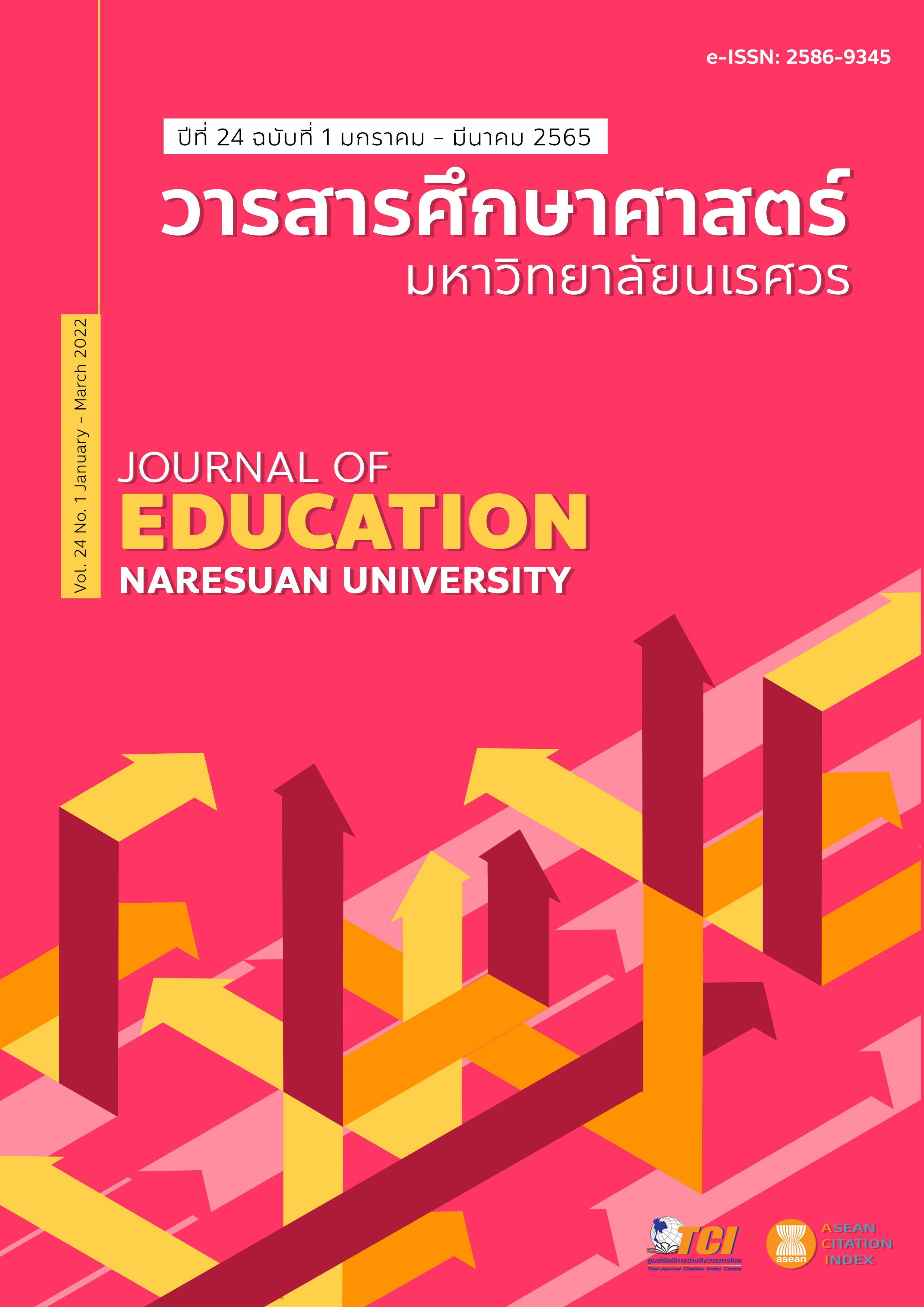THE DEVELOPMENT OF SMALL-SCALE SCIENCE LABORATORY DIRECTIONS ON ACID-BASE FOR ELEVENTH GRADE STUDENTS การพัฒนาบทปฏิบัติการวิทยาศาสตร์แบบย่อส่วน เรื่อง กรด-เบส สำหรับนักเรียนชั้นมัธยมศึกษาปีที่ 5
Main Article Content
Abstract
The objectives of this research were to develop small-scale chemistry experimental kits and small-scale science laboratory directions on acid-base for eleventh grade students has an efficiency with the criterion standard of 70/70, to compare learning achievement and scientific concepts of eleventh grade students before and after learning by using small-scale science laboratory directions on acid-base and after learning with criterion standard of 70%. The participants of this research were 27 eleventh grade students from medium-size secondary schools in Chonburi The research instruments consisted of the small-scale science laboratory directions on acid-base for eleventh grade students, the learning achievement test and the scientific concepts test on acid-base. The data were analyzed by means (), standard deviation (SD), t-test for dependent samples and t-test for one samples. The results indicated that the developing small-scale chemistry experimental kits on acid-base for eleventh grade students were comprised of 5 experimental kits used for 6 chapters in small-scale science laboratory directions which had an efficiency of 73.18/74.81 which was higher than the criterion standard of 70/70. the post-test mean scores of learning achievement of students after learning by using the small-scale science laboratory directions on acid-base were higher than pre-test and the post-test mean scores were higher than the criterion standard of 70% at .05 level and the scientific concepts of students after learning by using the small-scale science laboratory directions on acid-base were higher than before learning and the post-test mean scores were higher than the criterion standard of 70% at .05 level.
Article Details

This work is licensed under a Creative Commons Attribution-NonCommercial-NoDerivatives 4.0 International License.
The owner of the article does not copy or violate any of its copyright. If any copyright infringement occurs or prosecution, in any case, the Editorial Board is not involved in all the rights to the owner of the article to be performed.
References
Banthanachack, S. (2011). Conceptual change about substance in daily life for grade 7 students using problem-based learning approach. Journal of Education Graduate Studies Research Khon Kaen University, 5(4), 102-109. [in Thai]
Brahmawong, C., (2013). Developmental testing of media and instructional package. Silpakorn Education Research Journal, 5(1), 7-20. [in Thai]
Chemical Society of Thailand. (2015). Small-Scale Chemistry Laboratory. Bangkok: Dow Thailand Group. [in Thai]
Eilks, I., & Gulacar, O. (2016). A colorful demonstration to visualize and inquire into essential elements of chemical equilibrium. Journal of Chemical Education, 93(11), 1904-1907.
Faikhamta, C. (2008). Inquiry-based teaching and learning. Journal of Education Naresuan University, 11(1), 32-45. [in Thai]
Kowtrakul, S. (2016). Educational psychology (11th ed.). Bangkok: Chulalongkorn University. [in Thai]
Laohaphaiboon, P. (1999). Science teaching (3rd ed.). Bangkok: Thai Watana Panich. [in Thai]
Livingston, S. A. (1972). A classical test-theory approach to criterion-referenced tests. In The annual meeting of the American Educational Research Association (pp. 1-13). Maryland: Center for Social Organization of Schools Johns Hopkins University.
Muchaman, S. (2015). The experimental design of the visible light and absorbed light of copper complexes of [Cu(H2O)6]2+ [Cu(NH3)4]2+ and [Cu(en)3]2+ (Master thesis). Chonburi: Burapha University. [in Thai]
Ministry of Education. (2008). Basic Education Curriculum 2008. Bangkok: Printing Agricultural Cooperative Federation of Thailand. [in Thai]
National Institute of Educational Testing Service (Public Organization). (2018). Statistic of O-NET test results for grade 12, academic year 2014-2017. Retrieved March 29, 2019, from https://www.niets.or.th/th/catalog/view/3865 [in Thai]
Pholsan, N. (2014). The development of laboratory work in ionic bonding to develop science processing skills of mattayomsuksa 4 students at Kanaratbamrungpathumthani School (Master thesis). Bangkok: Rangsit University. [in Thai]
Phornphisutthimas, S. (2013). Learning management of science in 21st century. Journal of Research Unit on Science, Technology and Environment for Learning, 4(1), 55-63. [in Thai]
Prachagool, V., & Nuanngchalerm, P. (2010). Teaching style. Maha Sarakham: Mahasarakham University. [in Thai]
Saiyot, L., & Saiyot, A. (1995). Educational research techniques (4th ed.). Bangkok: Suviriyasarn. [in Thai]
Saiyot, L., & Saiyot, A. (2000). Learning measurement techniques (2nd ed.). Bangkok: Suviriyasarn. [in Thai]
Supamathanon, N., Soisungnoen, P., Lisnund, S., Panthama, N., Pechluan, P., Sombatsri, S., ... Ausavasukhi, A. (2016). Green chemistry. Journal of Science & Technology Ubon Ratchathani University, 18(3), 1-14. [in Thai]
Supasorn, S. (2012). Roles of mental models in learning chemistry at molecular level. Journal of Education Khon Kaen University, 35(1), 1–7. [in Thai]
Tamuang, S., Wuttisela, K., & Supasorn, S. (2017). Low-cost small-scale chemistry experiment to enhance 11-grade students’ conceptual understanding on chemical equilibrium. Journal of Research Unit on Science, Technology and Environment for Learning, 8(2), 379–397. [in Thai]


